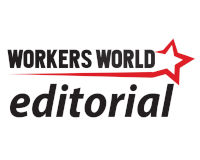U.S. imperialism suffered its second historical defeat in history on April 30, 1975, at the hands of the Vietnamese people when U.S. troops fled in helicopters from the rooftops of buildings in U.S.- occupied Saigon. One year following the overthrow of the South Vietnam U.S.-puppet regime, South and North Vietnam were reunited. Saigon was renamed Ho Chi Minh City in honor of the great communist president of North Vietnam – and Hanoi became the capital of the united country.
 This 25-year, undeclared U.S. war was initiated by President Harry Truman when he authorized a Military Assistance Advisory Group to assist the French military which invaded Vietnam for a second time in late 1946 and reestablished colonial rule.
This 25-year, undeclared U.S. war was initiated by President Harry Truman when he authorized a Military Assistance Advisory Group to assist the French military which invaded Vietnam for a second time in late 1946 and reestablished colonial rule.
The Vietnamese guerrilla army kicked the French colonizers out of the north in 1954 after a decisive battle at Dien Bien Phu. Washington sent advisers to the South’s puppet regime, and from 1964 to 1968, President Lyndon B. Johnson expanded the war, sending in over a half-million troops at one time.
From 1962 to 1975, an estimated three million Vietnamese, out of a population of over 46 million people, died in the genocidal war, along with over 58,000 U.S. troops. Washington expanded the war in part to counter the growing strength of the Chinese Revolution.
Along with the tremendous loss of life by U.S. troops carrying out massacres of civilians as well as the Vietnamese fighters, Vietnam was also a victim of ecocide. It has been well-documented that over four million tons of bombs were dropped on the mostly rural areas of South Vietnam by the U.S. Air Force.
Many unexploded bombs still threaten the lives and limbs of the population today. Additionally, 400,000 tons of napalm were used to not only maim the civilian population, but to also poison the soil, the water and the air.

North Vietnamese tank breaks down South Vietnamese presidential palace gate on April 30, 1975.
U.S. forces used Agent Orange, a deadly herbicide, to destroy vegetation and defoliate forests in an effort to expose Vietnamese liberation fighters. The herbicide contains the toxic chemical dioxin linked to cancer and birth defects. Even today, three million Vietnamese people, including children, are dealing with severe, debilitating health problems attributed to this deadly poison. The use of these inhumane weapons not only constituted U.S. war crimes against the Vietnamese people but harmed unprepared GIs.
A bittersweet commemoration
As the entire unified country of over 100 million people prepares for the 50th anniversary of “The Liberation of the South and National Reunification Day” on April 30 in Ho Chi Minh City, the Trump administration has strongly discouraged U.S. diplomats — including Marc Knapper, the U.S. ambassador to Vietnam — from attending this historic event.
That Vietnam prevailed against the U.S. superpower in this genocidal war and is still thriving is an embarrassing reminder of the defeat suffered by the most powerful military in the world at the hands of a determined, united people’s army led by the National Liberation Front in occupied South Vietnam and the North Vietnamese Army.
No arrogant diplomatic maneuver by Washington can erase the historic importance of this victory. Nor can Trump’s declaration of a huge tariff of over 40% on goods produced in Vietnam. Nor will the world forget that after signing a peace treaty that promised reparations for the irreparable lingering harm caused by the U.S. government and its military, the U.S. reneged.
Not only does the U.S. continue to deny billions of dollars in reparations, but it had the unmitigated gall to demand that Vietnam pay the U.S. $140 million in war debts borrowed by the puppet regime of South Vietnam in exchange for normalizing trade relations. This is similar to the French government’s audacious demand in the 19th century that Haiti pay reparations for the French enslavers’ loss of their profits following the victory on Jan. 1, 1804, of the first independent Black Republic in the Western hemisphere.
Vietnam’s victory in 1975 and its advances since continue to inspire workers and oppressed peoples everywhere — including the liberation struggle in occupied Palestine.
This inspired the great internationalist, communist revolutionary Che Guevara to declare, “Two, Three or Many Vietnams,” when referring to world revolution.
U.S. reparations to Vietnam now!
